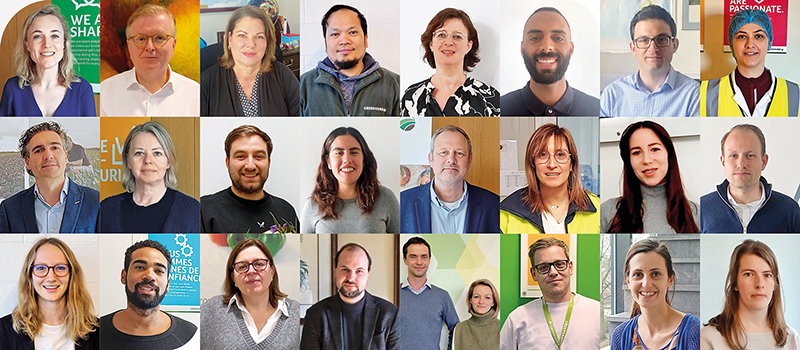
With our Strategy 2030, we have set the bar high. We have the outspoken ambition to be a frontrunner in our sector, with a clear focus on creating more sustainable food value chains. “Attracting and developing the talent to realise our ambitions will be crucial in this respect. This starts with ensuring we create an environment where we can get the right people, with the right mindsets, at the right place,” says Sarah Tijskens, Group HR Business Partner at Greenyard.
“We are a performance-driven organisation,” says Sarah Tijskens. “Our people are giving the best of themselves every single day. They are passionate about what they are doing, and they are willing to go the extra mile and help build and shape our organisation. We expect a lot from them, but we realise we also need to give back to them. We want our organisation to be a safe haven, where people find trust and support to perform to the best of their ability.”
The right guidance in every stage of life
This already starts at the very beginning of their career at Greenyard. At Bakker for example, we have an extensive program for young graduates. “We have been developing an extensive program for young graduates that enables them to soak up experiences across different departments of the company, or even across different countries. The program runs for a year-and-a-half and typically consists of three six-month periods in which they take up three different positions. It not only helps them to explore the different activities within our company, but it also gives them a better understanding of our company and allows them to build their network, which can be crucial in their later career.”
But it’s not just about attracting and developing young talent. “We believe that talent development and the right coaching are crucial elements throughout everyone’s career at Greenyard,” says Karin Faase, HR Manager at Bakker Barendrecht. “Over the years, we have worked out a talent development program which also takes into account people’s personal development. In every stage of their life and their career, everyone is confronted with different needs and challenges. If you want to develop people’s talents in the long run, you need to keep that in mind.”
“That is why we defined four main categories as a guidance for our efforts. There’s the green grapes, who are recently graduated and looking to soak up knowledge from every possible angle. Then there’s the red cherries, a few years older, probably with young children and maybe building or renovating their house. The oranges are approaching their mid-career and might have a little more time to look into new opportunities and broaden their horizon. Finally, there’s the golden pineapples who are in the final decade of their professional life. They have an enormous expertise and may want to take up a mentor role for younger people. This does not mean it’s a one-size-fits-all approach – everyone has their own very specific needs, but it does help us to look at talent development from a different and long-term perspective.”
A purpose-driven company
Sarah Tijskens works at the Group level, where she focuses on finding the right profiles in legal, IT, finance, communications and general management. “Despite a tight labour market, we have been able to fill in quite a number of important positions in the previous year, both in top management and crucial support functions. I do believe we have a big advantage when it comes to attracting talent. We are a purpose-driven company – we are actively promoting natural, plant-based food products that are not just better for our health, but for the planet as well. Today’s candidates have become much more conscious about the company they want to work for. Younger generations are particularly sensitive to this argument and are looking for a workplace where they can really contribute to a better world.”
Reflecting the world around us
Greenyard respects diversity in all its forms – nationality, religion, culture, language, age, gender and sexual preference – and ensures equal opportunities for all its employees. “We currently have people from approximately more than 80 nationalities working in our group, from many different backgrounds, speaking many different languages,” says Karin Faase. “It’s obvious we need to do everything we can to make sure everyone feels at home in our company. Although we do realise we still have many steps to take, we believe this will be a crucial element for the future of our company. As society is becoming increasingly diverse, it’s important to also have this evolution reflected in our own organisation at all levels and departments.”
